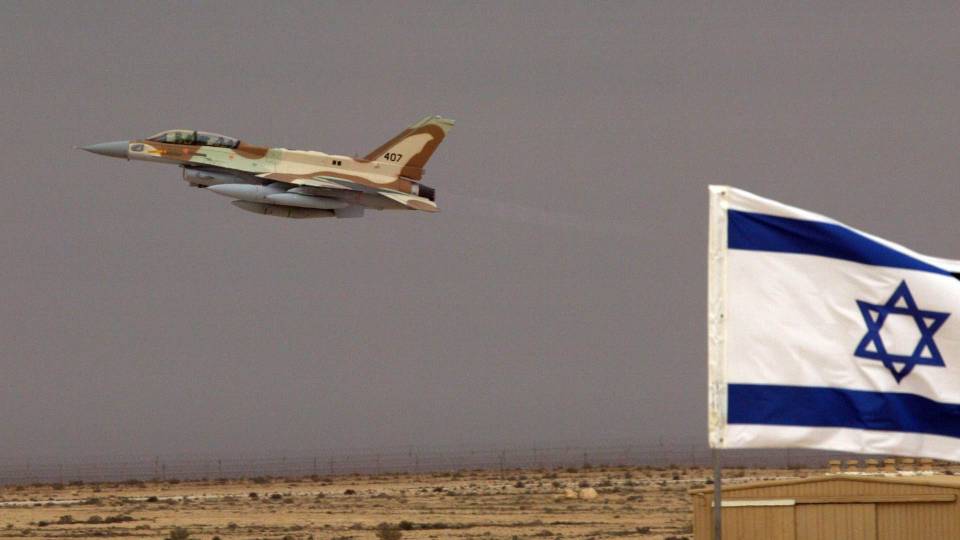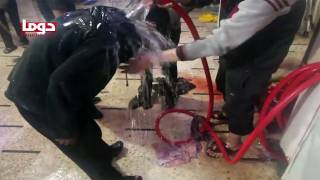Israel Attacked Chemical Weapons Plant in Syria, Local Reports Claim
Syria confirms: Israel targeted military facility, killing two. Incident comes amid massive Israeli anti-Hezbollah drill, weeks after outgoing air force chief admits Israel attacks weapons convoys.
The Israeli military struck Thursday a chemical arms plant in Syria, foreign media reports claimed. The Syrian army general command confirmed in a statement the attack on what they called a military facility, and said that two people were killed and extensive damage was caused. Israel refused to comment on the reports.
صور - النظام السوري يعلن مقتل 2 من جنوده في قصف إسرائيلي على ريف حماة pic.twitter.com/andBhSmrR7
— وكالة شهاب (@ShehabAgency) September 7, 2017
A Syrian military statement said that at 2:40 A.M. Israeli warplanes struck the site from within Lebanese airspace. In a statement, the Syrian army said the Israeli warplanes fired several missiles while in Lebanese air space, and warned of the "dangerous repercussions of such hostile acts on the security and stability of the region."
#BREAKING : Israel Airstrikes now on #Syria Regime Technology (chemical) building in #Hama pic.twitter.com/S24ZknPQv1
— Joyce Karam (@Joyce_Karam) September 7, 2017
Syrian opposition members claimed that four Israeli warplanes were involved in the strike, which would be the first since a ceasefire was reached between the Assad regime and Syrian rebels in July.
Israel allegedly targeted the Scientific Researchers Center, a plant involved with the development of chemical weapons, near the city of Masyaf in central Syria, reports said. By early Thursday, smoke could still be seen billowing over the area.
The war monitor, the Syrian Observatory for Human Rights, said the strikes hit a Scientific Studies and Research Center facility, the agency the U.S. describes as Syria's chemical weapons manufacturer.
The Observatory also said that a military storage camp next to the center was used to store ground-to-ground rockets and that personnel of Iran and its allied Lebanese Hezbollah group had been seen there more than once.
Opposition forces also said the target was a weapons factory that develops arms for the Syrian regime and for Hezbollah.
Lebanese media reported the presence of Israeli aircraft in Lebanese airspace early Thursday, however it is unclear whether it is related to the attack or to the large military drill currently taking place in Israel's north.
Former head of Military Intelligence Amos Yadlin tweeted that the Israeli attack "was not routine." He added that the site "produces chemical weapons and explosive barrels that have killed thousands of Syrian civilians," Yadlin wrote in his tweet.
"The attack is finally an Israeli moral statement about the massacre in Syria," he said.
Syrian forces have used chemical weapons more than two dozen times during the country’s civil war, including in April’s deadly attack on Khan Sheikhoun, UN war crimes investigators said on Wednesday.
Israel has attacked convoys bringing arms to Hezbollah and groups on several Israeli fronts dozens of times over the last five years, a top Israeli military commander has confirmed for the first time two weeks ago. The number of Israeli attacks on such convoys since 2012 is approaching triple digits, Maj. Gen. Amir Eshel, the outgoing commander of the Israel Air Force, told Haaretz.
Commenting on Thursday's attack, the Syrian army said the strike was "a desperate attempt" to raise the morale of terror organisation ISIS because of the recent losses the group has suffered at the hands of the Syrian military. According to the Syrian army, the attack attributed to Israel proves Israel's support of the global jihadist terror group.
The Syrian army has warned of "dangerous consequences to Israeli aggression in the region."
Various people, including Prime Minister Benjamin Netanyahu himself, have openly admitted to Israeli attacks on arms convoys to Hezbollah, but no numbers have been cited. Israel has been reluctant to talk about the scope of such attacks beyond its borders. Eshel's comments are the first time that a senior Israel Defense Forces officer has specifically revealed the practice.
Israel's army is currently carrying out its largest drill in 20 years in the north of the country, and encompasses all forces: ground, air, sea and intelligence. The drill, which will be overseen by Israel Defense Forces' Northern Command, is expected to through next week.
It will include a scenario of instant escalation, in which the army has to defend Israel against multiple terrorist infiltrations in the north.
This would be the first such Israeli strike in Syria since a cease-fire was reached in southern Syria in July. Israel, however, voiced its dissatisfaction with the fact that its security interests were not reflected in the draft cease-fire agreement formulated by the United States and Russia.
Last week, Netanyahu told visiting UN Secretary General Antonio Guterres on Monday that Iran is building sites to produce precision guided missiles in Syria and Lebanon.
Last month, Netanyahu stressed to Russian President Vladimir Putin the importance of removing Iranian and Hezbollah forces from Syria in order to prevent a future war.






















